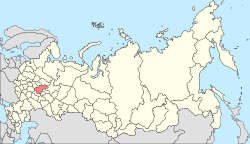Semyonovsky District
| Semyonov (in English) Семёнов (Russian) |
|
|---|---|
| - Town - | |
 House of Culture in Semyonov |
|
 Location of Nizhny Novgorod Oblast in Russia |
|
|
|
|
|
|
|
|
|
|
| Administrative status (as of May 2015) | |
| Country | Russia |
| Federal subject | Nizhny Novgorod Oblast |
| Administratively subordinated to | town of oblast significance of Semyonov |
| Administrative center of | town of oblast significance of Semyonov |
| Municipal status (as of December 2012) | |
| Urban okrug | Semyonovsky Urban Okrug |
| Administrative center of | Semyonovsky Urban Okrug |
| Statistics | |
| Population (2010 Census) | 24,473 inhabitants |
| Time zone | MSK (UTC+03:00) |
| First mentioned | 1644 |
| Town status since | 1779 |
| Postal code(s) | 606650–606654, 606667, 606669 |
|
|
|
| on | |
| 2010 Census | 24,473 |
|---|---|
| 2002 Census | 25,298 |
| 1989 Census | 26,282 |
| 1979 Census | 25,199 |
Semyonov (Russian: Семёнов) is a town in Nizhny Novgorod Oblast, Russia, notable for being a major center for traditional handcrafts such as Khokhloma wood painting and matryoshka dolls. As of the 2010 Census, its population was 24,473.
The town is situated in an area of lowland bogs and forests, about 100 kilometers (62 mi) northeast of Nizhny Novgorod, the administrative center of the oblast. The Kerzhenets River flows through the town. The surrounding area includes most of the Kerzhenets Nature Reserve, a federal-level strict ecological reserve, established for the protection and scientific study of the local ecology of the region.
It was established in the beginning of the 17th century as a settlement of Old Believers. According to an Old Believer legend, the Old Believer settlement in the area was spurred by the existence of the ancient Olenevsky Skete (today, the village of Bolshoye Olenevo, some 24 kilometers (15 mi) southeast from Semyonov), which had supposedly been founded in the 15th century by some of Venerable Macarius's monks to commemorate their leader's Miracle of the Moose that took place at that site, and later joined the Raskol.
The first documented mention of Semyonov was in 1644; it was referred to as Semyonov's hamlet, later as Semyonovo village, and from 1779 as the uyezd town of Semyonov.
From the beginning of the 19th to the early 20th century, it was a center for Old Believers movement and the only place to produce Old Believers' religious items such as lestovka prayer beads.
...
Wikipedia


